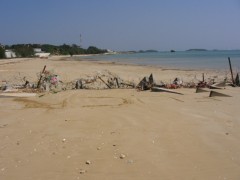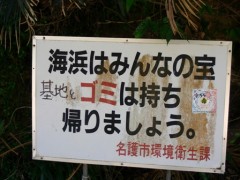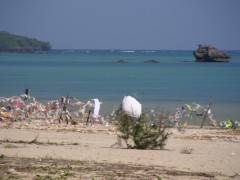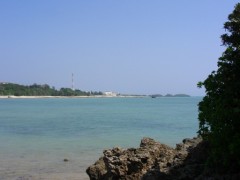02 March 2010
Olympic is nonsense event
Vancouver winter Olympic was over. Frankly, I do not care.
I was never interested in it because I think this event is just nonsense one.
There are many issues related to Olympic games such as doping, commercialism.
But my personal opinion is sports are just for leisure and health. I don't like heroism in it.
In fact, who wins or loses relies on how much money the athletes were invested by their sponsors.
That is why rich nations' athletes can get more medals than others because their sponsors could afford good facilities and coaches to make the athletes medalists. It is never fair games.
I do not like commercialism using athletes' heroic images. They are just good at sports, so what? They are not entertainers.
I want to say "Enjoy sports just for fun, leisure and health." Those who need professional skills for sports are only those who teach people how to do the sports like trainer or instructor.
If someone wants to take advantage of his or her physical advantage, use it for military, fire fighter, coast guard, police, construction work and other professional works which physical strength is vital. The below video shows such people. I like them.
24 January 2010
US military base Relocation Plan was rejected by local citizens
A candidate who opposes US military's relacation of Futenama Marine base in Okinawa to Henoko located on the same island won the mayor election of Nago city which includes Henoko area. Former mayors all agreed the relocation plan. The below photo is Henoko beach. The relocation plan is to landfill beautiful beach and ocean that endangers dugongs and other wild life. More than 30 of new species were found by WWF Japan in this area. Even U.S. environmetalist groups oppose the plan by suing their government. S.F. Federal Court ordered the military to review the plan.

This relocation plan has been controversial since new ruling party took power in September. New ruling party, Democratic Party of Japan announced alternative plan but it has yet reached agreement with the U.S.
This mayor election result proved to be Henoko plan is no longer feasible.
So where would Futenma be relocated to? Well, that is their business, not ours. To Guam where local citizens have no right to choose American President or mainland or reduce the marines.
The U.S. military is useless in this country. It was important during the Cold War era because its presence functioned as deterrent to Soviet Union and we could get financial aid from the U.S. and export Japanese goods to the U.S. market in exchange for providing bases to the U.S. which countered communism.
Now Soviet Union fell down, the Cold War ended. Not just Futenma, Kadena, Yokosuka, Yokota, Atsugi, Zama, Misawa, Iwakuni, Sasebo, all should be gone. We can protect our country ourselves, in fact we have to anyway.
The below photo is sign near the beach that says "Beach is our treasure. Take garbage (and base) to your home. Environment and Sanitation Department of Nago City." (and base) is handwritten.

U.S. military, GO HOME where you belong!!
23:48 Posted in Japan News, Politics, US-Japan relationship, USA issues | Permalink | Comments (1) | Tags: military
09 January 2010
An Alliance Larger Than One Issue
Read this New York Times Article written by Joseph Nye, an prominent expert of US-Japan relationship.
An Alliance Larger Than One Issue
SEEN from Tokyo, America’s relationship with Japan faces a crisis. The immediate problem is deadlock over a plan to move an American military base on the island of Okinawa. It sounds simple, but this is an issue with a long back story that could create a serious rift with one of our most crucial allies.
--Ommited paragraphs from the original article.--
Even if Mr. Hatoyama eventually gives in on the base plan, we need a more patient and strategic approach to Japan. We are allowing a second-order issue to threaten our long-term strategy for East Asia. Futenma, it is worth noting, is not the only matter that the new government has raised. It also speaks of wanting a more equal alliance and better relations with China, and of creating an East Asian community — though it is far from clear what any of this means.
When I helped to develop the Pentagon’s East Asian Strategy Report in 1995, we started with the reality that there were three major powers in the region — the United States, Japan and China — and that maintaining our alliance with Japan would shape the environment into which China was emerging. We wanted to integrate China into the international system by, say, inviting it to join the World Trade Organization, but we needed to hedge against the danger that a future and stronger China might turn aggressive.
After a year and a half of extensive negotiations, the United States and Japan agreed that our alliance, rather than representing a cold war relic, was the basis for stability and prosperity in the region. President Bill Clinton and Prime Minister Ryutaro Hashimoto affirmed that in their 1996 Tokyo declaration. This strategy of “integrate, but hedge” continued to guide American foreign policy through the years of the Bush administration.
This year is the 50th anniversary of the United States-Japan security treaty. The two countries will miss a major opportunity if they let the base controversy lead to bitter feelings or the further reduction of American forces in Japan. The best guarantee of security in a region where China remains a long-term challenge and a nuclear North Korea poses a clear threat remains the presence of American troops, which Japan helps to maintain with generous host nation support.
Sometimes Japanese officials quietly welcome “gaiatsu,” or foreign pressure, to help resolve their own bureaucratic deadlocks. But that is not the case here: if the United States undercuts the new Japanese government and creates resentment among the Japanese public, then a victory on Futenma could prove Pyrrhic.
The photo of planned relocation site for Futenma, the construction plan threatens lives of endangered marine mammals, dugongs and a lot of other wildlives.

14:40 Posted in Japan News, Politics, US-Japan relationship | Permalink | Comments (0) | Tags: military, okinawa
10 December 2009
U.S. environmentalists urge Obama to halt construction of Marine Base in Okinawa Japan
Not all of Americans are bad. There are Americans who oppose planned construction of U.S. Marine base in Henoko bay, Okinawa, Japan.

They also oppose Japan's whaling and dolphin hunting. I oppose whaling but not dolphin hunting.
Please read the following news from Mr. Mark J. Palmer, Earth Island.
Kind of good news if it works.
*************************
Copyright 2009 Inside Washington Publishers
All Rights Reserved
Defense Environment Alert
December 8, 2009
SECTION: Vol. 17 No. 25
LENGTH: 523 words
HEADLINE: Environmental Coalition Pressures Obama to Revoke Okinawa Airstrip Plan
BODY:
A major coalition of environmental groups is pressuring the Obama administration to revoke a plan to build a U.S. military airstrip over an ecologically sensitive area in Okinawa that is home to several endangered species, sensing recent political developments may open the door to changes in a U.S.-Japanese agreement to build the facility.
Led by the Center for Biological Diversity (CBD), a multitude of environmental groups representing over 10 million Americans, sent a letter to President Obama Dec. 3 calling on him to retract plans to expand a Marine Corps base in northeast Okinawa because it threatens to destroy habitat for coral reef ecosystems and critically endangered species like the Okinawa dugong, a sacred Japanese icon similar to a manatee. A 2006 bilateral agreement between the United States and Japan would relocate a contentious air station from an urban center in Okinawa to Camp Schwab, located in the northern part of the island.
The new facility is known as the Futenma Replacement Facility (FRF).
But high-level talks between the United States and Japan that begun last month signaled the two governments are revisiting the FRF plan, with the new Japanese government, installed in September, having run an election campaign that in part opposed the FRF's siting on Okinawa. Environmentalists saw the changes as a possible opportunity to get the military project moved or scuttled (Defense Environment Alert, Nov. 24).
The new Japanese government, led by Prime Minister Yukio Hatoyama, "is a very promising development on this issue" and environmentalists hope "that between the two governments, that they will realize that the current plan would cause unacceptable environmental impacts and change course," says one environmentalist central to the coalition's effort.
"The base plan would devastate dugong habitat in Henoko bay and nearby Oura Bay, and would be extremely harmful to turtles, fish, coral, and other marine life," the coalition of environmental groups say in their letter to Obama.
"The recently elected Prime Minister Yukio Hatoyama and the Democratic Party of Japan have expressed the desire to renegotiate the 2006 agreement and cancel plans to relocate the base. You have the ability and duty to alter the course of this devastating plan, but time is of the essence.
"We urge you to direct the U.S. secretaries of defense and state to cancel this project immediately." The letter is available on InsideEPA.com.
In addition to CBD, other groups signing the letter include Natural Resources Defense Council, Earthjustice, Greenpeace and the Endangered Species Coalition, which represents more than 400 organizations.
Environmentalists have long litigated against the Marine Corps' plan to create the FRF on Okinawa, citing concerns the facility would harm the habitat of the dugong. The proposed FRF would extend a 1.5-mile long airstrip over the sea, onto offshore seagrass beds that form the dugong's habitat. The FRF plan is part of a larger U.S. restructuring agreement with Japan that includes moving thousands of Marines and their dependents from Okinawa to be based on Guam (see related story).
21:51 Posted in Ecology, Japan News, Politics, US-Japan relationship | Permalink | Comments (0) | Tags: okinawa, military





